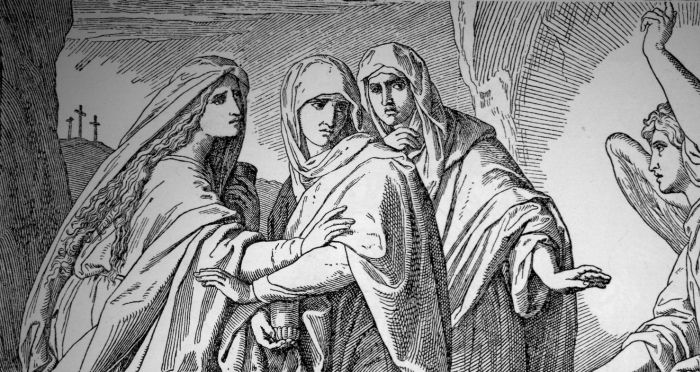A whole host of people shaped my formative years. I was parented not only by my wonderful mother and father, but I was also given an incredible legacy of grandparents and relatives. Alongside my biological family, I was raised in an evangelical Quaker church where I was given spiritual mothers and fathers who taught and empowered me in my faith.
When I started reading Scripture, I realized God's family isn't limited to bloodlines and that God's presence shows up in a variety of ways. God was meeting me in men and women, nurturing me through fathers and mothers. These spiritual pilgrims parented me into my adult faith. It made me wonder what this could mean about who God is.
God as Mother
Most of us are familiar with God as Father. But if God is our Father, could God also be our Mother? Matthew and Luke both record Jesus teaching us to pray to "Our Father who is in heaven," giving gendered language to God as a male parent. This bears deep significance: in the cultures near Israel, gods weren't considered loving parents you could speak with personally. Scripture contains numerous other masculine metaphors for God—not only as Father, but also as Lord, Warrior, King. These images can denote strength, protection, and provision. But the psalmist reminds us that even masculine metaphors can have a nuanced meaning:
"Just as the eyes of servants attend to their masters' hand,
just as the eyes of a female servant attend to her mistress' hand—
that's how our eyes attend to the Lord our God
until he has mercy on us" (Psalm 123:2-3 CEB).
The master can be both female and male, as can many other feminine-centered images in Scripture. The metaphor isn't so much about God being a gender, as helping us understand how we relate to our Creator and how our Creator relates to us.
Feminine Imagery
God is identified through female animal metaphors such as mother bear (Hosea 13:8), mother eagle (Deuteronomy 32:11-12), and mother hen (Matthew 23:37 and Luke 13:34). The book of Isaiah repeatedly harnesses the imagery of the female body for God, describing God as a woman in labor (42:14), a nursing mother (49:15), and a mother comforting her child (66:13). Hosea 11:3-4 (CEB) gives vivid imagery of a mother caring deeply for her child, saying:
"Yet it was I who taught Ephraim to walk;
I took them up in my arms,
But they did not know that I healed them.
I led them
with bands of human kindness,
with cords of love.
I treated them like those
who lift infants to their cheeks;
I bent down to them and fed them."
This imagery paints a picture of a mother who cares for scraped knees, scooping up little ones and snuggling them to her face. This familiarity and comfortableness demonstrates a deep level of tenderness, telling of a nurturing God who is a mother as well as a father.
Beyond Gender
God is Spirit, and our gender roles do not apply to God directly. Yet God connects with all humanity through relationships we can understand. God is identified to Moses as "I AM WHO I AM," in one of the most profound and mysterious definitions we are given in Scripture (Exodus 3:14). Yet Moses later gives this same God a much more human identifier, telling the people, "You deserted the rock that sired you; you forgot the God who gave birth to you!" (Deuteronomy 32:18). The Creator of the universe exists as intimately with humanity as a mother who grows a child in her womb.
In Luke 15, we are given a trio of stories on lost things: a shepherd searching for a lost sheep, a woman searching for a lost coin, and a father with two lost sons. God in these parables serves as the shepherd, the woman, and the father. This set of stories intended to teach about the kingdom of God realistically gives metaphors of two genders, with God's relationship to humanity as the greater truth than any one relationship can contain.
The Gift of Metaphor
The metaphors for God are graces poured into our lives, allowing us to more intimately know a deeply relational God. Within God's nature there is room enough for both a Mother and Father. And with both of these metaphors of God we are found, secured, and supported as children of the most loving Parent.
Read more posts about: Women, Mother’s Day
Thanks to the support of our faithful financial partners, American Bible Society has been engaging people with the life-changing message of God’s Word for more than 200 years.
Help us share God's Word where
needed most.
Sign up to receive Bible-reading tips, tools and resources.




